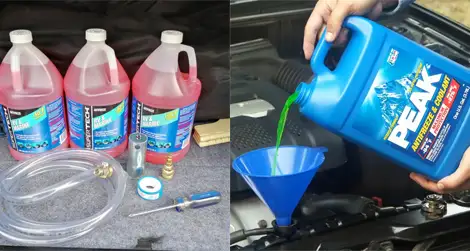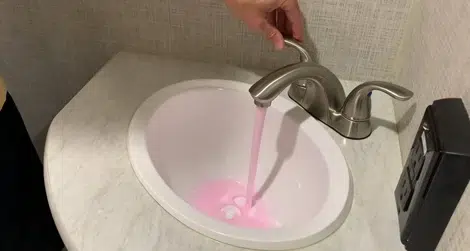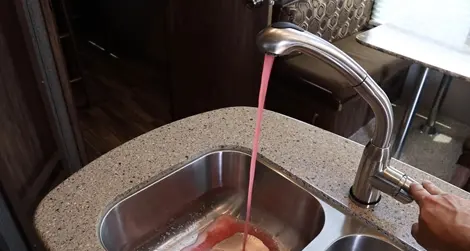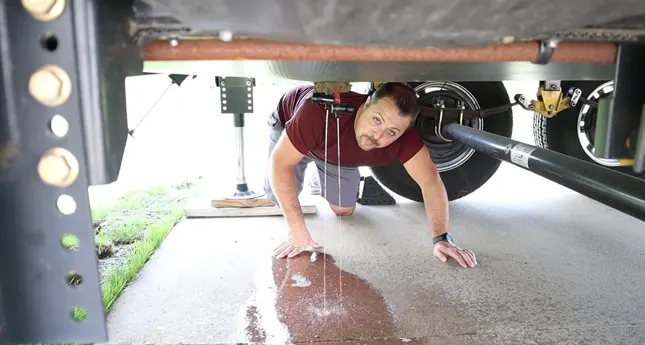Last Updated on April 10, 2023
During the winter months, your RV water lines are more vulnerable to freezing and bursting. To prevent this from happening, you will need to use RV antifreeze.
This will help to keep your RV plumbing system from freezing and will also prevent any damage that could occur from the freezing and thawing process. Once the winter season is over, you will need to properly dispose of the RV antifreeze.
Knowing how to dispose of RV antifreeze correctly is essential since if it is not done correctly, it can harm the environment.
We will discuss the proper methods for dumping RV antifreeze so that you can do your part in keeping the environment safe.
What Materials Are Used to Make RV Antifreeze?

The main ingredient in RV antifreeze is ethanol or propylene glycol. These two ingredients make up the vast majority of RV antifreeze solutions.
Ethanol is an organic chemical material. The liquid is colorless and flammable. Propylene glycol is also a synthetic liquid. A colorless, viscous liquid with a sweet taste, propylene glycol is a liquid with no odor.
Sometimes, both ethanol glycol and propylene glycol deicer are used in RV antifreeze solutions, but at maximum times only one or the other is used.
Differences Between RV Antifreeze and Automotive Antifreeze

There are some key differences between RV antifreeze and automotive antifreeze. RV antifreeze is used to protect your RV’s water system from freezing and bursting during the winter months.
Automotive antifreeze work as an engine coolant. This type of liquid is made from ethylene glycol deicer. RV antifreeze solutions are non-toxic. On the other hand, automotive antifreeze solutions are toxic.
Ideas on How to Dispose of RV Antifreeze?

Although pink RV antifreeze is not toxic, it is still a chemical, so you should take great care when disposing of it. Because it can be harmful to the environment and animals if not done correctly.
RV antifreeze should not be poured down the drain or on the ground. You need to find a proper disposal method for it. Below are some suggestions for proper RV antifreeze disposal.
1. Take It to a Waste Management Facility
It is advisable to take all the antifreeze to a local waste management facility for disposal. They will have the proper RV antifreeze disposal methods and will make sure that it does not harm the environment.
These professionals are knowledgeable about how to handle and get rid of RV antifreeze. Also, some states have laws that require you to take RV antifreeze to a waste management facility. You can therefore contact your local waste management facility to dump RV antifreeze safely.
2. Recycle It
Another option for disposing of non-toxic RV antifreeze is to recycle it. You can take it to the local RV antifreeze recyclers that accept RV antifreeze. They will recycle RV antifreeze and reuse it. This is a great way to dump antifreeze and help the environment at the same time.
3. Give It Away
You can also give your used antifreeze away to someone who can use it. If you know someone who needs this liquid, you can give it to them. They will be able to use it and dispose of it properly. This will save you the trouble of disposing of it yourself.
Why Should You Never Dispose of Antifreeze on the Ground?

After knowing the different RV antifreeze disposal methods, you might be wondering why you never can RV antifreeze dumping on the ground. Below are some reasons why.
1. It Can Contaminate Soil and Water
One of the main reasons why you should never dispose of RV antifreeze on the ground is that it can contaminate the soil and water.
When this liquid is poured onto the ground, it can seep into the soil and groundwater. This can contaminate the soil and water and make them unsafe for use.
2. It Can Harm Animals
Another reason why you should never dispose of the liquid on the ground is that it can harm animals. When animals drink water that has been contaminated with this liquid, it can make them very ill.
In cats and dogs, it may result in hematologic or blood-related conditions. In some cases, it can even be fatal.
3. It Can Melt Permafrost
A surprising reason for never disposing of RV antifreeze on the ground is that it can melt the permafrost. The permafrost is a layer of permanently frozen soil.
However, when the antifreeze is poured on the ground, it can melt the permafrost, resulting in the ground becoming unstable. This will have a negative impact on the environment.
4. Dissolved Oxygen Levels Decrease In Water
When RV antifreeze is poured into the ground, it can reach water bodies such as lakes and rivers.
In water, RV antifreeze can decrease dissolved oxygen levels. This can be harmful to aquatic life as they need to be dissolved oxygen to survive.
5. It Can Be Harmful to Humans
RV antifreeze can also be harmful to humans. If it is ingested in large amounts, it can be poisonous.
It can also cause lactic acidosis and metabolic acidosis, which can be fatal. This is why it is very important to properly RV antifreeze disposal and never pour it on the ground.
6. Chlorosis Can Occur In Grass and Plants
Another reason why you should never dispose of RV antifreeze on the ground is that it can cause chlorosis in grass and plants. Chlorosis is a condition in which the leaves of a plant turn yellow due to a lack of chlorophyll.
This can be harmful to plants and grass. The environmental importance of grass and plants cannot be overstated. If they are harmed, it can have a negative impact on the environment and the ecosystem.
7. Harmful Overall to the Environment
RV antifreeze can be harmful to the environment in many ways. As it can contaminate soil and water, it can also harm plants, grass, and animals.
It can also melt permafrost and decrease dissolved oxygen levels in the water. This is why it is very important to dispose of RV antifreeze properly and never pour it on the ground.
What Should You Do In Case Antifreeze Spills Outside?

In case antifreeze spills outside, you should immediately take action to clean it up. Below are the steps you should take to clean up a spill:
Step 01: Shut Off the Source of the Spill
The first thing you should do is to shut off the source of the spill. If you are using a hose to pour RV antifreeze, turn off the valve so that no more antifreeze can come out.
Step 02: Absorb the Spill With an Absorbent Material
Once you have shut off the source of the spill, you should absorb the spill with absorbent material. This can be something like sand, sawdust, baking soda, or cat litter. Wear gloves and a mask while doing this in order to protect yourself from the fumes.
Step 03: Dispose of the Absorbent Material
Once you have absorbed the spill, you should dispose of the absorbent material. You should never pour it down the drain or on the ground. The best way to dispose of it is to put it in a plastic bag and throw it in the trash.
Step 04: Rinse the Area With Water
The area should be rinsed with water after you have removed the absorbent material. This will help to remove any remaining antifreeze from the ground.
Step 05: Wash Your Hands
After you have cleaned up the spill, you should wash your hands with soap and water. This is to ensure that you don’t contaminate yourself with RV antifreeze.
Frequently Asked Questions:
There are some frequently asked questions about RV antifreeze. Below are some of the most common questions and their answers.
1. How Long Does RV Antifreeze Have a Shelf Life?
RV antifreeze has a shelf life of one to four years. Nevertheless, it must be stored in a cool, dry area. In addition, the cap should be tightly sealed to prevent evaporation.
2. How Many Gallons of Antifreeze Should I Use?
The amount of antifreeze you should use depends on the climate, temperature, and the size of your RV. In general, you need to use two to three gallons of RV antifreeze.
3. Which Holding Tank Should Be Used for RV Antifreeze?
Three holding tanks are present in an RV, which are the fresh water tank, gray water tank, and black or septic system water tank. It is recommended that you use RV antifreeze in the black sewer system and gray water tanks.
4. How Do I Add Antifreeze to My RV?
The process of adding the antifreeze to your RV is quite simple. You just need to pour it into the RV’s tank through the sink or toilet pipeline.
Conclusion:
RV antifreeze is a necessity for RVs, but it must be disposed of properly. It should never be poured on the ground or into the drain as it can be harmful to the environment.
We hope that you have a full understanding of how to dispose of RV antifreeze, as well as why it is so imperative. Do your part in preserving our planet by disposing of RV antifreeze properly.



